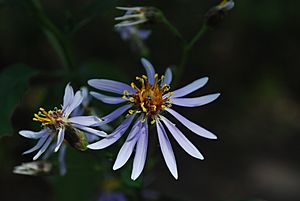Largeleaf aster facts for kids
Quick facts for kids Largeleaf aster |
|
|---|---|
 |
|
| Conservation status | |
| Scientific classification | |
| Synonyms | |
|
Synonymy
Aster macrophyllus L.
Aster multiformis E.S.Burgess Aster riciniatus E.S.Burgess Aster ianthinus E.S.Burgess]] Aster nobilis E.S.Burgess Aster roscidus E.S.Burgess Aster violaris E.S.Burgess Biotia latifolia Cass. Biotia macrophylla (L.) DC Eurybia jussiei Cass. Aster ambiguus Bernh. ex Nees Aster jussiei (Coss.) E.S.Burgess Aster latifolius Desf. Aster polyphyllus Moench Aster subcymosus Bernh. ex Nees |
The Largeleaf aster (scientific name: Eurybia macrophylla) is a beautiful wild plant. People also call it the bigleaf aster or bigleaf wood aster. It's a type of plant that lives for many years. It belongs to the composite family, which is a group of flowering plants.
This plant grows naturally in eastern North America. You can find it from eastern and central Canada all the way down to Georgia in the Appalachian Mountains. It also grows west to Minnesota, Missouri, and Arkansas.
The Largeleaf aster's flowers bloom in late summer or early fall. They usually have petals that are deep lavender or violet. Sometimes, the petals can even be white. The center of the flower starts out cream or light yellow. As it gets older, the center turns purple. This plant is also one of the parents of a hybrid plant called Eurybia × herveyi.
Contents
Where the Largeleaf Aster Lives
The Largeleaf aster is native to parts of eastern and central Canada. It also grows in the northern parts of the eastern and central United States. Its range goes as far south as northern Georgia in the Appalachian Mountains.
In Canada, you can commonly find it in Manitoba, Ontario, Quebec, New Brunswick, Nova Scotia, and Prince Edward Island. In the United States, it grows in all states east of Minnesota, Iowa, Illinois, Missouri, and Tennessee. It might even be in Mississippi.
This plant has also been introduced to northern Europe. This means it was brought there by people, and now it grows in the wild.
What Kind of Places it Likes
The Largeleaf aster usually grows in places that are 0 to 1300 meters (0–4300 feet) above sea level. It likes soils that are moist to dry. You often see it in forests with hemlock and northern hardwood trees. It also grows in beech-maple or pine forests.
Sometimes, you can find it in spruce forests, or with aspen trees. It also likes thickets, clearings, or along shaded roadsides.
Protecting the Largeleaf Aster
In some places, the Largeleaf aster needs special care to make sure it keeps growing. In the state of Iowa, it is listed as an endangered plant. This means there are very few of them left there. In Rhode Island, it is a "special concern" plant. This means people are watching it closely to make sure its numbers don't drop too low.
How People Use the Plant
The Largeleaf aster has been useful to people for a long time.
As Food
The young leaves of the Largeleaf aster are big and thick. People can cook them and eat them as greens. The Algonquin people of Quebec, Canada, have traditionally used the leaves in this way.
As Medicine
Native American tribes have also used this plant for medicine:
- The Iroquois people used the root to help with blood issues. They also made a special drink from the roots to help with digestion.
- The Ojibwa people used a special liquid made from this plant. They would bathe their heads with it to treat headaches.
- The Ojibwa also smoked parts of the plant as a hunting charm. They believed it would help them attract deer.
- They ate the young leaves as both food and medicine. They also used the roots to make soup.
Images for kids



